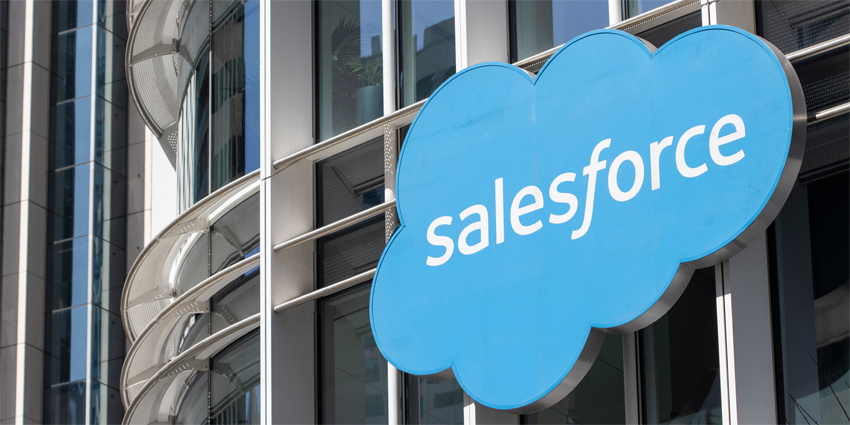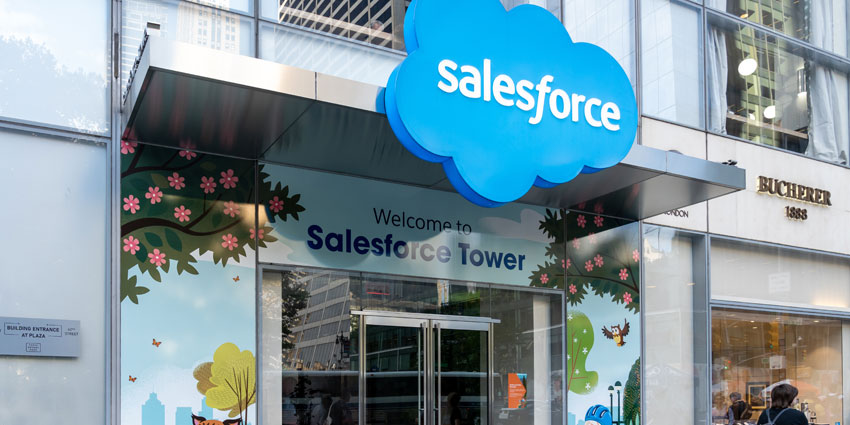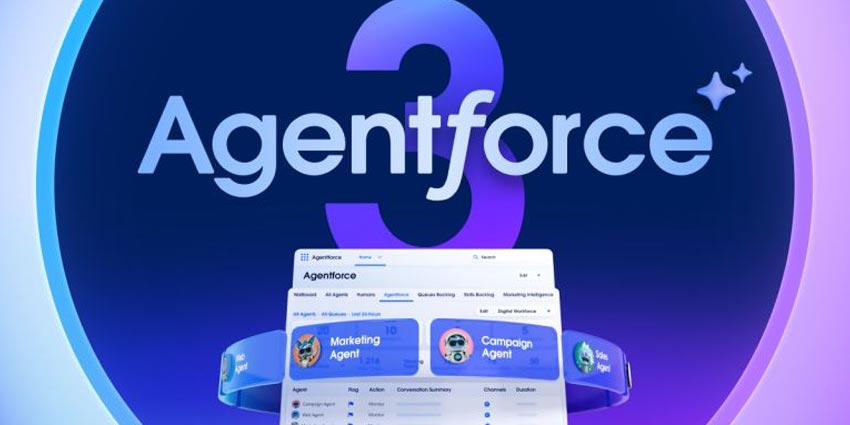In the world of technology rivalries, few are bigger than the battle of Microsoft Dynamics vs Salesforce. Two of the best-known and most popular choices for customer relationship management, Salesforce and Microsoft offer an incredible combination of robust features, intelligence, and analytics. While there are certainly other vendors to explore, Salesforce and Microsoft Dynamics are at the top of the list for many companies.
In terms of market share, Salesforce is probably the most popular CRM software out there. However, Microsoft is quickly making waves as a clear competitor to the Salesforce giant. The delivery of new intelligent tools, excellent scalability, and extensive integrations is drawing plenty of new attention to the Microsoft ecosystem.
So, how do you decide which solution is right for you?
We’re here to help.
Salesforce CRM: Features
The Salesforce CRM is made up of various “modules” designed to focus on specific things, like sales, marketing, and customer service. Companies can pick the cloud modules most important to their business, mix-and-match capabilities, or even invest in the Salesforce platform for connecting and integrating various apps and tools.
The three central components of the Salesforce CRM are the Sales Cloud, Service Cloud, and Marketing cloud, but Salesforce has plenty of additional solutions to offer too, including:
- Field service lighting: for field service management
- Commerce cloud: for online retail
- Pardot: for marketing automation
- DMP: For data management
- CPQ: For pricing management
- Community cloud: for self-service portals
- Salesforce platform: for app management
- Einstein: for AI analytics
Let’s take a closer look at what the three central Salesforce CRM modules offer.
Sales Cloud
The Salesforce CRM Sales cloud offers a host of cloud-based tools intended to improve conversions, productivity, and pipeline performance. Features include:
- Contact management
- Lead management
- Opportunity management
- Dashboards and reports
- Email integration
- Salesforce mobile
- Sales forecasting
- Files sync and share
- Approval and workflow
- Data management
Services Cloud
Service cloud is designed to enhance customer service experiences with responsive, intuitive tools for impression our customers. Features include:
- Lightning service console
- Omni-channel routing
- Case management
- Workflow and approvals
- Social customer service
- Telephony integrations
- Macro automation
- Account and contact management
- Custom reports and dashboards
- Asset and order management
Marketing Cloud
The marketing cloud supports fantastic customer interactions designed to convert leads into paying clients. Features include:
- Data management
- Email marketing
- B2B marketing automation
- B2C customer journey management
- Digital advertising
- Mobile messaging
- Social media advertising
Microsoft Dynamics 365 CRM: Features
Similar to Salesforce, Microsoft splits the features of its CRM solution into various segments. The Dynamics also has a Sales, Marketing, and Service module as the basis for its CRM offering, but companies can also access tools for things like:
- Microsoft Finance tools
- Operations and field service management
- Project service automation
- Commerce for online and offline retail
- HR for managing staff relationships
Users can choose the selection of Dynamics tools they want to access with their CRM investment, though most will start with the Sales, Marketing, and Service modules.
Dynamics 365 Sales:
Microsoft Dynamics 365 sales features help users to build better relationships with customers so they can increate conversions. Some of the features available include:
- Customer data management
- Partner relationship management
- Task management and assignment
- Funnel and opportunity management
- Contract management
- Quote and order management
- Team collaboration
- Customer service management
- Knowledgebase
- Reporting and analytics
Microsoft Dynamics 365 for Service:
The service solutions from Microsoft Dynamics fall into two categories: customer service and field service. Both options include features like:
- Self-service support with virtual agents
- Productivity tools for agent performance
- Proactive IoT service
- Knowledgebase management
- Incident routing
- Cross-channel customer case management
- AI-based scheduling for field service
Microsoft Dynamics 365 for Marketing:
The Microsoft Dynamics 365 Marketing solutions elevate customer experiences by helping companies to create personalised experiences across all touchpoints. Features include:
- Customer journey mapping
- Real-time engagement tools
- Event and segment-based marketing
- Cross-channel communications
- Email marketing
- Landing pages
- Social media management
- Webinars
- Power BI reporting and analytics
Microsoft Dynamics vs Salesforce: Deployment and Integrations
Both Microsoft Dynamics and Salesforce CRM solutions are available via the cloud. If you’re looking for a way to accelerate your digital transformation, you can do so with both providers. Microsoft Dynamics also offers an on-premises solution for those who need to keep things like finance and operations within the business environment.
Part of what makes both Salesforce and Microsoft so compelling is also their ability to integrate and connect with other business systems. Salesforce can easily link to a range of contact centre and communication tools, as well as solutions like Teams for collaboration. Salesforce also recently purchased Slack for team productivity purposes.
Salesforce’s AppExchange is brimming with integrations to more than 3,000 third-party tools. Salesforces also has an extensive partner ecosystem with tons of valuable connected platforms.
Microsoft automatically integrates with the extensive Microsoft ecosystem of tools like Business Intelligence, Microsoft Teams, Office 365, and so on. If the Microsoft ecosystem isn’t enough, you can also find a host of additional integrations within the Microsoft AppSource environment. While Microsoft’s app and integration selection aren’t quite as advanced as Salesforce’s just yet – the company is gaining ground.
Microsoft Dynamics vs Salesforce: AI and Intelligence
To succeed in today’s competitive landscape, you need to understand your customers on a deeper level. Both Salesforce and Microsoft enable this by offering a range of AI and intelligence solutions within the CRM ecosystem. AI features allow for deeper insights into customer sentiment, trends, and even common problems your clients might face.
Einstein AI is the intelligence offering from Salesforce, and it’s widely regarded as one of the best in the world. The built-in intelligence offered by Einstein features advanced learning algorithms capable of understanding the unique selling habits of each company. This means your CRM system gets to know your business and offers proactive suggestions on how to improve.
Einstein AI can immediately provide employees with guidance during the customer journey, giving them the tools, they need for better service and sales. You can also add elements of automation into the mix to speed up time to resolution or sale.
Microsoft Dynamics 365 also has its own built-in AI functionality. With Microsoft intelligent tools, you can track customer sentiment, needs, and market trends, predict future sales, and even access relationship health notifications. Microsoft makes it easier to see which of your customer relationships need more work, and it can also provide contextual guidance to employees throughout the customer journey.
Microsoft Dynamics vs Salesforce: Pricing
As great as it would be to choose a CRM solution with no concerns about pricing, most companies will have a specific budget to consider. Salesforce’s pricing can be a little difficult to understand at first, because there are so many different apps, licensing levels, and other optional add-ons to consider. You’ll be charged based on the number of users you have and the features in your package.
Dynamics 365 pricing can be a little tricky too. There are ERP apps available alongside your CRM, and you’ll also find various additional add-ons and extras to ramp up your costs. It is possible to work with partners on building packages of Dynamics products, however.
Overall, Salesforce can be a little more expensive than Dynamics 365, particularly if you want to access features like Einstein, which is an extra cost (compared to Microsoft AI, which is free).
What are the Main Differences between Salesforce and Microsoft?
Microsoft and Salesforce both offer a lot of similar features when it comes to customer relationship management. Salesforce focuses most of its attention on the sales, marketing, and service cloud, while Microsoft offers those modules alongside financial, operations, commerce, and HR tools.
Microsoft offers both cloud and on-premises CRM technology, while Salesforce focuses exclusively on the cloud. You also don’t get as many integrations on Microsoft as you do on Salesforce, but you do get in-depth connections with the Microsoft ecosystem.
From an AI perspective, Dynamics 365 intelligence features are packaged into the CRM with no need for additional costs. Einstein AI might be more extensive, but it’s also an extra cost to consider each month. You’ll also pay a little more overall for Salesforce in most cases, depending on the feature set you need. Fortunately, Salesforce also helps you to get started with your CRM a lot faster through training and webinars.
Microsoft vs Salesforce: Which is Best?
Both Microsoft and Salesforce offer the core features many businesses would need from a CRM solution, including automation, journey tracking, customer relationship management, marketing, and exceptional service enhancements. It’s no wonder choosing between the two is so difficult.
Microsoft Dynamics is probably one of the most flexible tools for CRM, with access to AI-driven insights as standard, cloud or on-premises deployment, and deep integration into the Microsoft 365 ecosystem. You can access tools like Microsoft customer voice to learn what your customers are feeling and unlock intelligent information with native integrations into LinkedIn’s Sales Navigator, for better B2B sales opportunities.
Dynamics also has a more extensive range of features available for the field service environment, so you can empower the employees in your staff not sitting behind a desk.
Alternatively, Salesforce provides companies with high-level intelligence and sophisticated tools for sales. The Salesforce environment can be a little more complicated to get used to at first, but it’s extremely in-depth when it comes to things like predicting customer needs and creating personalized marketing campaigns.
Which CRM will you choose?







